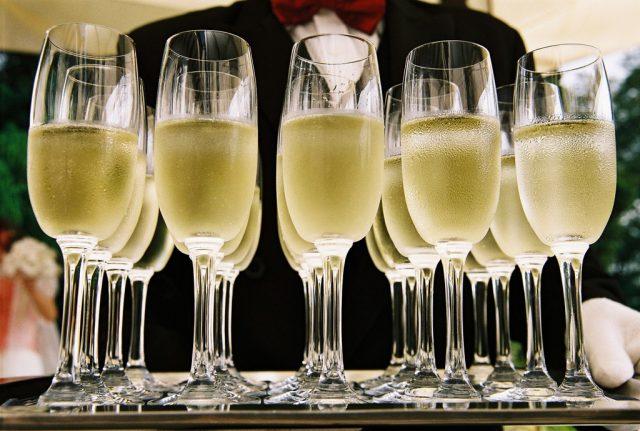Is the world entering a new cold war or a hot peace?
Posted By Graeme Dobell on February 11, 2019 @ 06:00

As alcohol is an operational fluid of defence and diplomacy, it’s natural that this Wednesday’s debate on new cold war versus hot peace is a champagne challenge (the winner buys the champagne).
At the Canberra HQ of the Australian Institute of International Affairs, I’ll make the case for hot peace, while the former Oz diplomat Tony Kevin will argue that we’re in a new cold war. Come along and cast your vote [1].
According to Kevin, this new conflict on an old pattern involves three major Western strategies aggressively in play against Russia and China: overt and covert information warfare, provocative military strategies, and attempted exclusion from international economic mechanisms.
He argues: ‘This new cold war lacks the ideological confrontation and autarkic strategies of the US–Soviet cold war—both sides belong to and aspire to play leading roles in the one global order and multilateral trading system—but it is a real cold war nevertheless, with the US and its NATO allies trying to effect regime change on Russia and its partners. With Russia’s newfound strength and confidence, this is unlikely.’
My response is we shouldn’t revive a dangerous label that doesn’t fit today’s facts: Why don the old binary bifocals of a bipolar bloc confrontation?
What we have now is an era of intense contact in which competition and cooperation are simultaneous. Many different players. Many different games. The hot peace will be defined by complex compromises as much as by contest—warm work, not frigid standoff.
Tony is dashing back from a visit to Russia for the debate. To reduce his sleep-debt handicap, here’s the case I’ll make.
No ideological content. The cold war was a contest of ideas and values: communism fighting capitalism, Marxism versus democracy. Not now. There’s a weird ideological vacuum shared by Donald Trump, Xi Jinping and Vladimir Putin: power is all. Xi nods to the party’s communist heritage but the sole cause is to hold power. Trump nods to the Republican Party’s heritage but the sole cause is to hold power. Putin nods … etc.
Economics and trade. The Soviet Union wanted to overthrow the economic system championed by the US. Comecon versus capitalism. Bloc against bloc. Economic sphere facing economic sphere. Not this time. Everyone wants to win at the same game, not change the rules. China embraces what America has created; now Beijing aims to own it. The US–China trade war is a monumental dogfight about hierarchy, riches and power. Eventually, Trump will cut a deal and declare victory—because the central reality of the US–China economic relationship is interdependence.
The status quo rules. China wants to match the reigning superpower. Match, not fight. Far from being a revisionist power [2], China is a status-quo-tidal power [3]—loving the status quo and loving the way it’s shifting towards Beijing. A fine example of how this status-quo-tidal shift works is that China has quickly stepped up to become ‘the pillar of UN peacekeeping [4]’.
Competition and cooperation, not containment. What China and the US are fighting about is what they share and what they both want to dominate. The competition will be defined by its connections and closeness. Two superpowers seeking to be number one. Both want to sit atop the system, not overthrow the system.
The past as prologue. The cold war followed the most destructive war in human history. War set the context of the era, as decolonisation merged with the superpower struggle. Today’s prologue is the long international peace—more than 70 years for Europe, more than 40 years for Asia. The long peace is getting a pressure test and the contest is warming, but it’s going to take a lot more poor strategy and economic stupidity before we need to reach for the war metaphor.
The US isn’t up for a cold war. On any given day, Trump agrees with about half the declared policies of his administration (I exaggerate, but not much). He wants trade wins not protracted strategic struggle. Can you imagine The Donald signing up to an activist policy that’ll be measured in decades? America is in no mood to ‘bear any burden, meet any hardship, support any friend, oppose any foe [5]’. One of the few things Trump shares with Barack Obama is the desire to step back from foreign entanglements and responsibilities—the traditional Washington policies that Obama dismissed as ‘the blob’. Obama’s wariness and Trump’s nihilism speak of an America with little appetite for a great new international campaign.
Neither Europe nor Russia is up for a global contest. Led by Germany and a reasonably resolute France, Europe will balance off against a Putin whose heritage is more Mother Russia and the Tsars than Lenin. Berlin and Paris have a lot of historical experience to draw on. Pity Britain has taken leave of its geopolitical and geoeconomic senses.
Not blocs, but strategic free-for-all. We face more cacophony than concert of powers. The new era is multipolar. Diverse powers and diverse competitions. Constantly shifting interests will mean shifting coalitions rather than firm alignments. The hot peace will have many elements of cooperation mingled with the competition.
Tune in for the next column to see how the corks popped.
Article printed from The Strategist: https://aspistrategist.ru
URL to article: /is-the-world-entering-a-new-cold-war-or-a-hot-peace/
URLs in this post:
[1] cast your vote: https://aiiaact.tidyhq.com/public/schedule/events/22863-new-cold-war-or-hot-peace
[2] revisionist power: /us-china-status-quo-powers-revisionist-times/
[3] status-quo-tidal power: https://archive.lowyinstitute.org/the-interpreter/china-status-quo-tidal-power
[4] the pillar of UN peacekeeping: https://www.theguardian.com/world/2018/sep/24/china-starts-to-assert-its-world-view-at-un-as-influence-grows
[5] bear any burden, meet any hardship, support any friend, oppose any foe: https://en.wikipedia.org/wiki/Kennedy_Doctrine
Click here to print.